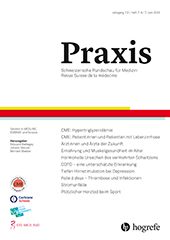CME: Ambulantes Management von Patientinnen und Patienten mit Leberzirrhose
Abstract
Zusammenfassung: Viele Ursachen einer Zirrhose sind modifizierbar. Daher soll ätiologisch abgeklärt werden. Nach Diagnosesicherung wird die Grundkrankheit behandelt und die Betroffenen werden beraten (Alkoholabstinenz, Rauchstopp, gesunde Ernährung, Impfungen, körperliche Betätigung). Zum Varizenscreening wird eine Gastroskopie empfohlen. Patientinnen und Patienten mit Leberzirrhose haben ein erhöhtes Risiko für hepatozelluläre Karzinome, deshalb sollten sie halbjährlich eine Lebersonografie und die Bestimmung des Tumormarkers alpha-Foetoprotein machen (HCC Surveillance). Nach erster Dekompensation (z.B. Varizenblutung, Aszites, Enzephalopathie) oder Verschlechterung der Leberfunktion sollte eine Listung zur Lebertransplantation evaluiert werden. Die Kontrollhäufigkeit richtet sich nach Krankheitsstadium und eingetretenen Dekompensationen. Viele Komplikationen (z.B. Varizenblutung, spontan bakterielle Peritonitis, akutes Nierenversagen unter NSAR oder Diuretika) beginnen oligosymptomatisch und können rasch zu Multiorganversagen führen. Daher sollte bei Verschlechterung von Allgemeinzustand, Kognition oder Laborbefunden niedrigschwellig eine rasche Diagnostik erfolgen.
Abstract: Many causes of cirrhosis are modifiable. Therefore, etiologic clarification is mandatory. After diagnosis, the underlying disease must be treated and patients advised as to alcohol abstinence, smoking cessation, healthy diet, vaccinations and physical exercise. Gastroscopic screening for oesophageal varices is recommended. Patients with cirrhosis should undergo surveillance for hepatocellular carcinoma (biannual sonography and alpha-fetoprotein assessment). Following a first complication (e.g., variceal haemorrhage, ascites, encephalopathy) or deterioration of liver function, listing for liver transplantation should be evaluated. Control intervals should be individualized according to disease severity and previous decompensations. Many complications (e.g., bleeding, spontaneous bacterial peritonitis, acute renal failure due to NSAIDs or diuretics) have insidious onsets but may rapidly lead to multiple organ failure. Rapid diagnostics are recommended if patients show clinical, mental or lab deterioration.
Bibliografie
. Ätiologie, Diagnose und Prävention einer Leberzirrhose. Dtsch Arztebl Int. 2013;110:85–91.
. Matrix metalloproteinases as potential biomarkers and therapeutic targets in liver diseases. Cell. 2020;9:1212.
. Liver cirrhosis. Lancet. 2008;371:838–851.
.
Leberzirrhose und ihre Komplikationen. Muche M, Somasundaram R, translators . In: Longo D Fauci A Kasper D Hauser S Jameson J Loscalzo J , editors. Harrisons Innere Medizin, Band 3. 18th ed. Dietel M, Suttorp N, Zeitz M, publishers of translated edition. Berlin: ABW Wissenschaftsverlag; 2012;2805–2817.. Liver cirrhosis. Lancet. 2014;383:1749–1761.
GBD 2019 Diseases and Injuries Collaborators. Global burden of 369 diseases and injuries in 204 countries and territories, 1990–2019: a systematic analysis for the Global Burden of Disease Study 2019. Lancet. 2020;396:1204–1222.
. Evolution of NAFLD and its management. Nutr Clin Pract. 2020;35:72–84.
. Clinical Practice Guidelines on non-invasive tests for evaluation of liver disease severity and prognosis – 2021 update. J Hepatol. 2021;75:659–689.
S2k Guideline non-alcoholic fatty liver disease. Z Gastroenterol. 2015;53:668–723.
Mayo Clinic . MELD Calculator. www.mayoclinic.org/medical-professionals/transplant-medicine/calculators/meld-model/itt-20434705; letzter Zugriff 29.12.2022.. Natural history and prognostic indicators of survival in cirrhosis: a systematic review of 118 studies. J Hepatol. 2006;44:217–231.
. The MELD score in patients awaiting liver transplant: strengths and weaknesses. J Hepatol. 2011;54:1297–1306.
. Clinical Practical Guidelines on the management of acute (fulminant) liver failure. J Hepatol. 2017;66:1047–1081.
S3-Leitlinie: Diagnostik und Therapie des hepatozellulären Karzinoms und biliärer Karzinome – Version 2.0 – Juni 2021, AWMF-Registernummer: 032-053OL. Z Gastroenterol. 2022;60:e131–e185.
. Clinical Practice Guidelines for the management of patients with decompensated cirrhosis. J Hepatol. 2018;69:406–460.
Aktualisierte S2k-Leitlinie der Deutschen Gesellschaft für Gastroenterologie, Verdauungs- und Stoffwechselkrankheiten (DGVS) «Komplikationen der Leberzirrhose»: AWMF-Nr.: 021-017. Z Gastroenterol. 2019;57:611–680.
. Covert hepatic encephalopathy: Can my patient drive? J Clin Gastroenterol. 2017;51:118–126.
. Subclinical hepatic encephalopathy. Semin Liver Dis. 1996;16:321–328.
. The number connection tests A and B: interindividual variability and use for the assessment of early hepatic encephalopathy. J Hepatol. 1998;28:646–653.
The animal naming test: An easy tool for the assessment of hepatic encephalopathy. Hepatology. 2017;66:198–208.
. Validierung des Simplified Animal Naming Tests als primäres Screening Instrument für die Diagnose der covert hepatischen Enzephalopathie in einem deutschen Patientenkollektiv. Mainz; Johannes Gutenberg-Universität: 2022.
. Hepatocellular carcinoma. Lancet. 2018;391:1301–1314.
. Management of hepatocellular carcinoma: SASL expert opinion statement. Swiss Med Wkly. 2020;150:w20296.
. S3-Leitlinie der Deutschen Gesellschaft für Ernährungsmedizin (DGEM) in Zusammenarbeit mit der GESKES, der AKE und der DGVS. Aktuel Ernahrungsmed. 2014;39:e1–e42.
. EASL Clinical Practice Guidelines on the management of hepatic encephalopathy. J Hepatol. 2022;77:807–824.
Bundesamt für Gesundheit, Eidgenössische Kommission für Impffragen . Schweizerischer Impfplan 2021. Bern; BAG: 2021.. Vaccination in chronic liver disease: An update. J Clin Exp Hepatol. 2022;12:937–947.
. Niederländische Empfehlungen zur sicheren Anwendung von Arzneimitteln bei Leberzirrhose. Arzneimittelverordnung in der Praxis. 2020;47:11–17.



